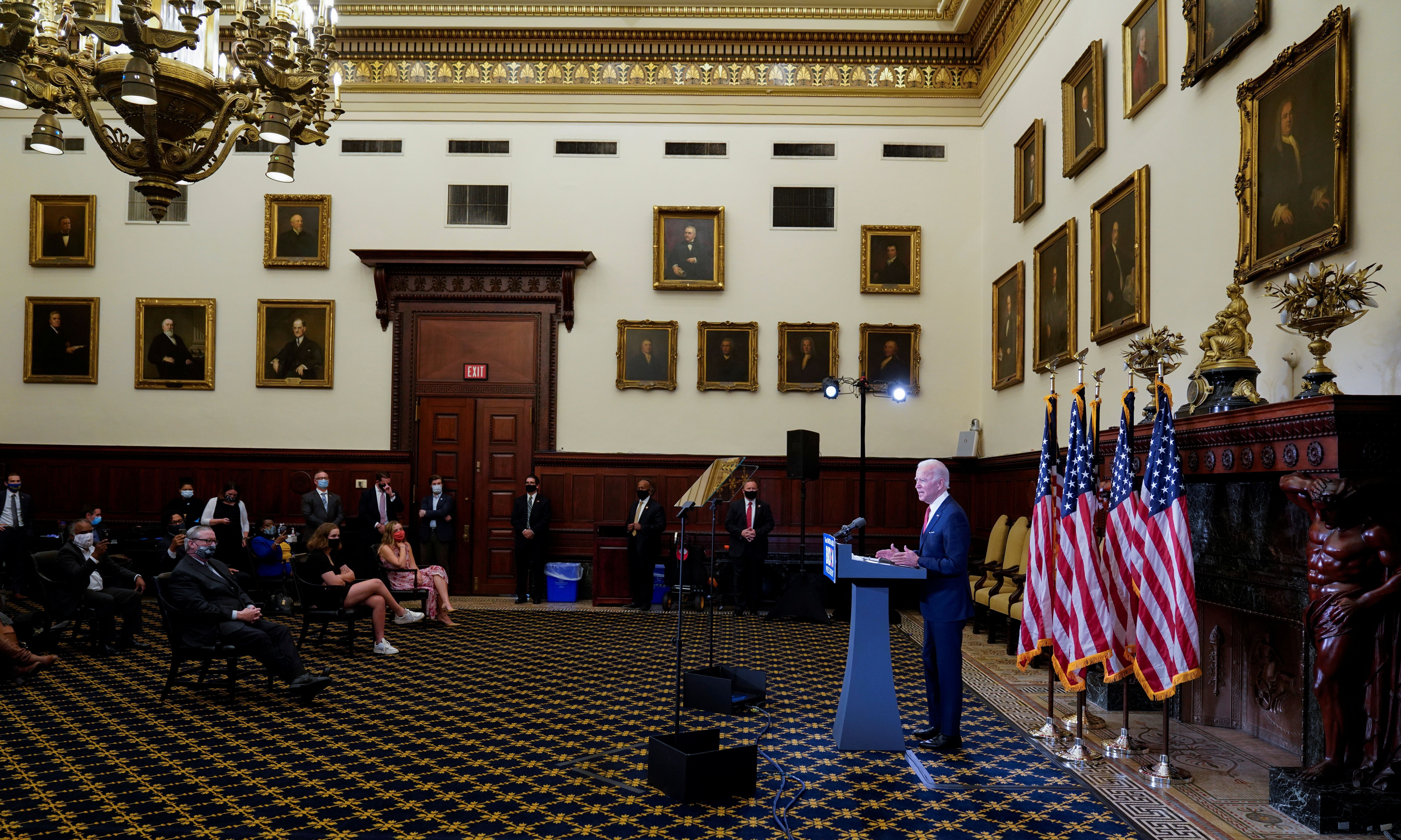U.S.-Ukraine Relations after Biden’s Victory

Bilateral Relations under Trump
In relations with Ukraine, President Donald Trump abandoned the policy of his predecessor, Barack Obama, which was to support the country in exchange for progress in democratic reforms. Instead, he engaged in transactionalism, such as contracts for American companies. To meet these expectations, Ukraine started to import American coal, purchased arms, and began talks with Energy Secretary Rick Perry on LNG imports. Despite this, political relations deteriorated in 2019 due to Trump’s attempt to entangle Ukraine in U.S. domestic politics. In a telephone conversation with President Volodymyr Zelensky, Trump tried to pressure his counterpart to have the Ukrainian Prosecutor’s Office investigate Joe Biden’s son, Hunter for alleged corruption. The transcript of the conversation became the basis for initiating Trump’s impeachment. Ukrainian diplomacy successfully distanced the country from the events in the U.S.
However, U.S. actions against Russia, even during the Trump administration, and the cross-party consensus in Congress on the importance of providing support for Ukraine have meant U.S.-Ukraine relations have favoured the latter. Despite attempts by the U.S. President to reduce support for the Ukrainian military, it has maintained its effectiveness. Ukraine also received Javelin anti-tank missiles, the sale of which were blocked by the Obama administration, which feared an escalation of the situation in Donbas. In July 2018, Secretary of State Mike Pompeo issued the Crimean Declaration, in which he stressed that the U.S. does not recognise the annexation of the peninsula by Russia (despite the lack of a clear declaration from Trump himself).
Biden's Policy
As vice-president in the Obama administration, Biden was responsible for U.S. policy on Ukraine. He favours supporting the country, conditional on progress in introducing democratic reforms and not on short-term financial benefits. Biden has visited Ukraine many occasions, pressing Ukrainian politicians for reforms each time. As a result of his pressure, in 2016 General Prosecutor Viktor Shokin resigned, also in the face of accusations of corruption by the EU, IMF, and World Bank.
Statements from the Biden election campaign indicate that his policy towards Ukraine will be an element of deterring Russia’s aggressive policy and supporting democratic institutions in the world. According to Biden, it is in U.S. interests to raise the potential of the Ukrainian armed forces to increase the costs of a possible escalation of the conflict by Russia. After his victory in the election, Biden declared his willingness to cooperate with France and the UK in resolving the conflict in Donbas, which may mean that his administration will try to work out a new format for negotiations with Russia with the participation of the U.S. An important issue for the Biden administration in relations with Ukraine will be the fight against corruption, which the new president considers to be that country’s biggest challenge. Biden will condition further U.S. support on progress in Ukraine in this area. His administration also will exert pressure on Ukraine to carry out reform of the judiciary, which is judged by Ukrainians and experts to be the most corrupt institution.
Ukraine’s Expectations
Ukraine has viewed Biden’s election as positive, and President Zelensky congratulated him on 7 November, just after the president-elect declared victory. From the Ukrainian point of view, U.S. policy under Trump has been unpredictable and entailed the risk of suspending support for Ukraine for political reasons. In turn, Biden is seen in Ukraine as a politician favourable to Ukraine, and his programme largely coincides with Ukrainian expectations (including Ukraine's national security strategy). Also, the most important issue for Ukraine is the continuation of U.S. deterrence of Russia. Ukraine is counting on American involvement in resolving the Donbas conflict, which is the most important electoral promise made by Zelensky. In 2019, the Ukrainian president proposed the inclusion of the U.S. in talks on this subject, which Russia does not want to agree to. On 25 October, Zelensky organised a national referendum in which, despite the low turnout, 74% of respondents were in favour of “using the guarantees provided by the Budapest Memorandum”, which is a 1994 document in which Russia, the U.S., and the UK committed themselves to respecting the territorial integrity of Ukraine. Zelensky, citing this public approval, may seek the involvement of the U.S. in the talks on the Donbas conflict.
In addition to diplomatic support, Ukraine counts on maintaining U.S. technical and training assistance for its military and granting Ukraine the status of a major non-NATO ally. This status confers many privileges, including cooperation on research-and-development projects and in the field of space technology, mutual training, and priority for the supply of surplus armaments. A bill proposing the granting of this status to Ukraine was submitted to the U.S. Congress in May 2019 but has not yet been discussed. An important subject of mutual relations will also be the increase in U.S. investment in the Ukrainian arms sector and, in particular, the future of the Ukrainian company Motor Sich. Ukraine wants to make sure that its withdrawal of the sale of the company to the Chinese company Skyrizon, as demanded by the U.S. under Trump, is linked to American investment. In economic relations, although not a priority due to the low amount of exchange (about 2.5% of Ukrainian exports go to the U.S.), Ukraine will be interested in abolishing the duties on steel and aluminium introduced by Trump.
Conclusions and Perspectives
Biden will likely return to the policy pursued by the Obama administration towards Ukraine. The U.S. pressure to fight the kleptocracy will, however, meet with strong resistance from Ukrainian oligarchs and a large part of the political class. They will probably sabotage the reforms initiated by the Zelensky administration in this regard. This may result in a further weakening of the ruling party. President Zelensky may, however, use the U.S. pressure to weaken some oligarchs, such as Ihor Kolomoysky, who has assets in the U.S. American pressure to fight corruption in Ukraine, regardless of the resistance of some in the Ukrainian political class, will not, however, affect the perception of the U.S. in Ukraine as a strategic partner due to the importance of the American military and diplomatic support.
Biden may be interested in joining the U.S. to the negotiations to settle the Donbas conflict. An extension of the Normandy format is unlikely until Russia demonstrates a willingness to engage in constructive dialogue with Ukraine. The U.S., on the other hand, can engage in direct talks with Russia, as happened under Obama’s presidency (Nuland-Surkov talks). At the same time, Biden will be seeking to ensure that the EU maintains its sanctions against Russia and that other Alliance states increase their military support for Ukraine. The chances of the U.S. recognising Ukraine as a major ally outside NATO will also increase.
Regarding economic relations, Ukraine can count on abolishing customs duties on steel and aluminium as part of a shift away from Trump’s protectionist trade policy, although this issue may depend on the Ukrainian government’s efforts to reduce the political influence of local oligarchs, who would benefit most from the abolition of duties. Concerning energy policy, it is possible, in turn, to suspend the project of long-term supply of American LNG to Ukraine through Poland. This project, promoted by former Secretary Rick Perry, is considered by Ukraine to be risky and unprofitable. While it would deprive Poland of potential profits from transit, Polish companies could then engage more closely in gas extraction in Ukraine and export under short-term contracts to meet Ukraine’s demand for natural gas.


